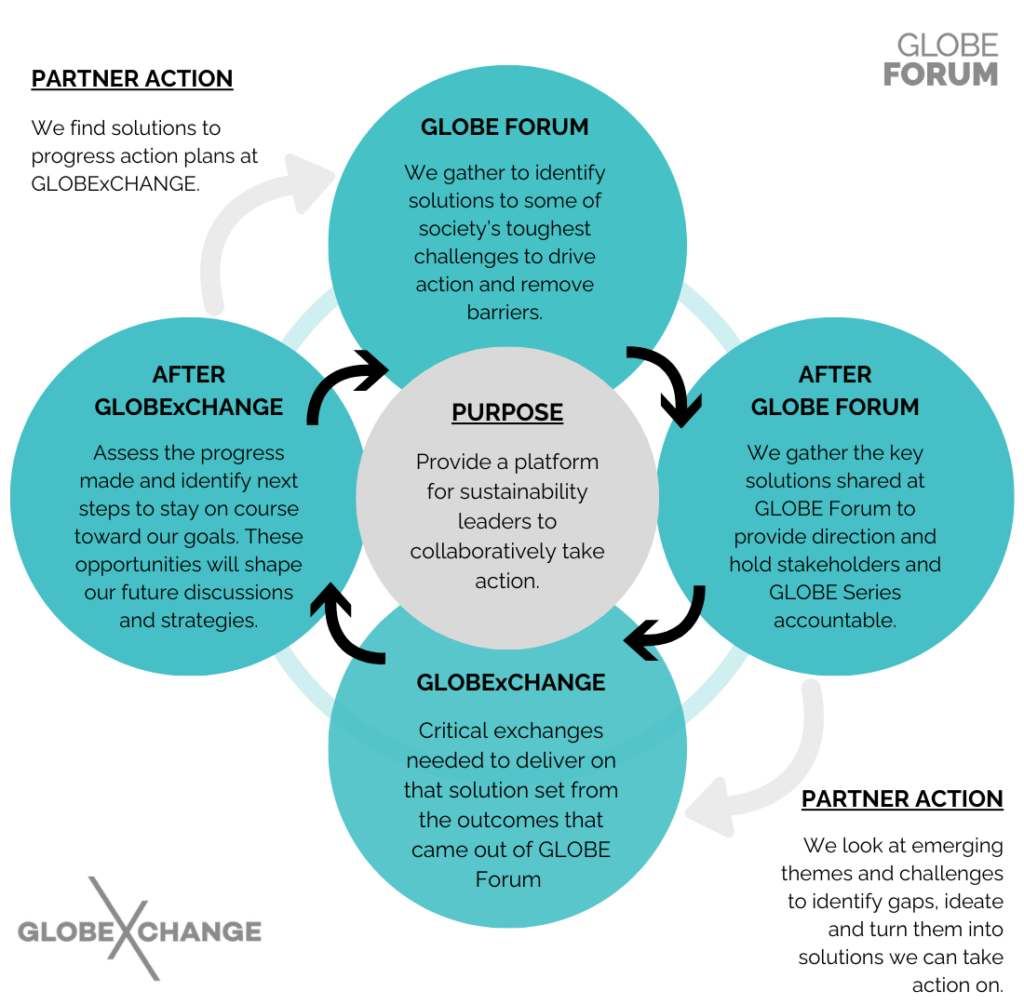GLOBE Series holds two signature events in alternating years: GLOBE Forum in Vancouver, and GLOBExCHANGE in Toronto. Leaders from Canada and around the world join us at these events to share ideas, gain inspiration, and make connections. But these events are about more than that: they are about accelerating action at the system and sector levels.
How? By consolidating solutions and key takeaways identified at our events to create action-oriented steps to reach our goals. We use the outcomes from each event to inform the programming for our next event, assess the progress that has been made in the past 12 months, and determine next steps and actions.
At GLOBE Forum 2022, we came together to uncover the 10 areas we need to take action in the next 10 years to get on a path to net zero. At GLOBExCHANGE 2023, we enabled the critical exchanges, connections and transactions requires to bring those action areas to life.
We are pleased to share The Path to Net Zero: 10×10 Matrix outcomes from GLOBExCHANGE 2023, which set the stage for the next big conversation at GLOBE Forum 2024. We hope these will propel us even further on the journey to a regenerative and sustainable future.
2-Year Event Cycle: A Catalyst for Action

Thank you to our sister organizations, Delphi and Leading Change Canada, and our other partners for their support in uncovering and compiling these priority actions. While every effort has been made to ensure the accuracy and relevance of this information, the takeaways may not capture the perspectives and insights of all attendees.
Mobilizing & Deploying Capital
GLOBExCHANGE sessions that focused on Mobilizing & Deploying Capital:
- Targeting Success: The Role Sustainable Finance Plays in Reaching Net Zero
- Skills that Pay the Bills: How Sustainability is Shaping the New Working World
- Bridging the Divide: From Sustainable Taxonomy to Net-Zero Business Action
Priority Actions:
- Investors need to diversify portfolios and ensure that investment decisions are climate resilient, leveraging climate modeling to assess risks and inform decision making.
- Financial institutions should adopt back casting, starting with the end goal in mind, to plan and implement climate-resilient strategies that encourage innovation and create opportunities for climate-related products and services.
- Investors need to prioritize investing in pre-seed, early-stage startups working on climate solutions to drive progress in the clean economy.
Unlocking Innovation
GLOBExCHANGE sessions that focused on Unlocking Innovation:
- Challenging the Status Quo: A Values-Based Approach to Business
- The Future of Capital for Cleantech Innovation and Scale in Canada
- Avoiding Innovation Silos: Connecting the Cross-Sector Dots for Meaningful Progress towards Net Zero
Priority Actions:
- Given the limited resources of small teams, organizations and Individuals need to share knowledge with internal and external stakeholders to build capacity; these expert networks will support innovative discussions and information sharing.
- Government needs to examine the role of public funds in investment policy development and compliance to support innovation and scale up climate-related solutions.
- Constructive collaboration between government and sector leaders, along with a streamlined government approval process, will help remove barriers to innovation.
Aligning Transparency, Standards, & Reporting
Select sessions at GLOBExCHANGE 2023 that saw stakeholders engage on Aligning Transparency, Standards, & Reporting:
- Driving Impact: Standardization in ESG Reporting
- Preparing for the Impacts of a Changing Climate: An Enterprise Risk Management Opportunity
- Regulatory Developments for ESG in North America
Priority Actions:
- Government needs to establish a regulatory framework for measuring and reporting scope 3 emissions that sets consistent standards across jurisdictions, while recognizing the difficulty in measuring and balance setting meaningful targets and meeting external expectations.
- Businesses, financial institutions, and governments should develop credible climate plans with interim goals to account for all emissions (scope 1, 2, and 3) and focus on absolute emissions reductions guided by Just Transition, UNDRIP principles, climate modelling and other credible reporting standards.
- Organizations need to regularly report on their climate plans, incorporating both positive and negative outcomes to support transparency. Collaboration, use of guiding principles and proper governance are necessary to ensure data trustworthiness.
Advancing Resiliency
GLOBExCHANGE sessions that focused on Advancing Resiliency:
- Ensuring Resiliency: Leveraging Scenario Analysis to Prepare for Climate Consequences
- Addressing Social Risks of Climate Change
- Removing Roadblocks: Advancing Resiliency Projects
Priority Actions:
- Organizations need to consult with vulnerable and impacted communities to empower community voices, foster open and collaborative communication and decision making, and address inherent biases.
- All stakeholders need to create space — and develop the skills and understanding needed — for intergenerational conversations on sustainability and resilience issues.
- Businesses should nurture diverse talent with the evolving skillsets needed in climate and sustainability roles in order to grow a resilient workforce.
Creating a Circular Economy
GLOBExCHANGE sessions that focused on Creating a Circular Economy:
- Future Proofing: Making Your Business More Circular
- Sustainable Procurement: Your Secret Tool Against Scope 3 Emissions
- The Future of Work: Leveraging Circular Economy Opportunities
Priority Actions:
- Encourage Individuals to reuse and share goods within their communities to create a network of local exchange and collaboration, reduce waste, and support the growth of the sharing economy.
- Sector leaders should shift their focus to circular-economic models to avoid waste and pollution, while also exploring innovative ways to utilize waste (e.g., converting tree waste into biofuels and developing value-added supply chains).
Implementing Nature-Based Solutions
GLOBExCHANGE sessions that focused on Implementing Nature-Based Solutions:
- From Theory to Action: Translating the Global Biodiversity Framework into Practice
- Nature is Next: Integrating Biodiversity Risks into Financial Decision Making
- Unlocking the Net-Zero Potential of Value-Added Forestry
Priority Actions:
- Businesses should utilize tools to identify the ecosystem services they rely on and understand the value of nature and how it impacts business operations.
- Prioritize meaningful Indigenous partnerships in our conservation efforts, guided by Conservation through Reconciliation Partnership (CRP) initiatives, such as the 30% biodiversity protection by 2030 goal.
- Businesses and organizations should invest in nature to support biodiversity and ecosystem restoration, including the recovery of endangered species, and strategically target landscapes with biodiversity loss for conversation and restoration.
Centering Indigenous, Leadership, Engagement, & Ways of Knowing
GLOBExCHANGE sessions that focused on Centering Indigenous, Leadership, Engagement, & Ways of Knowing:
- Reconnection: Overcoming Climate & Mental Health Crises Through Indigenous-led Social Transformation
- Collaborating on Climate Solutions: Indigenous Partnerships for a Net-Zero Future
- The Role of Indigenous Inclusion and Participation in Achieving ESG Objectives
Priority Actions:
- Involve Indigenous governments in decision-making processes, ensuring that appropriate protocols are in place to with respect to managing projects, addressing regulatory and environmental issues, and incorporating meaningful ownership.
- Foster genuine commitment to reconciliation through partnerships and transparency, ensuring equity for Indigenous Peoples in projects that prioritize mutually beneficial opportunities.
- Embrace life cycle thinking and incorporate concepts from Indigenous knowledge, such as the Seven Grandfather Teachings, through engaging with Indigenous communities and government.
Leveraging Infrastructure & the Built Environment
GLOBExCHANGE sessions that focused on Leveraging Infrastructure & the Built Environment:
- Leading With Technology: Co-Creating a More Sustainable Future
- Opportunities for Private Investment in Sustainable Infrastructure
- Catalyzing Private Investment in Climate Resilient Infrastructure
Priority Actions:
- When planning to retrofit communities for the future, prioritize actions such as inventorying natural-gas HVAC equipment and replacement dates, and conducting carbon audits instead of energy audits.
- Develop decarbonization transition plans for existing buildings to upgrade the suite of building systems and reduce impacts on tenants.
- Integrate circular-economy principles into building design, such as advancing modular-construction methods and addressing value-chain issues, e.g., embodied carbon (the carbon emissions released during the lifecycle of building materials)
Shifting to Low Carbon Transportation
GLOBExCHANGE sessions that focused on Shifting to Low Carbon Transportation:
- A Sustainable Approach to Supply Chain Management
- Introducing the Net Zero Supply Chain Initiative
- Critical Infrastructure: Achieving the Success of Widespread EV Deployment
Priority Actions:
- Incent the transition away from fossil fuels and create unified approaches to accelerating cleaner energy through increased collaboration and aligning goals between government and other stakeholders.
- Take advantage of quick wins to tackle scope 3 emissions, such as offsetting business travel and establishing sustainable procurement criteria.
Accelerating the Clean Energy Transition
GLOBExCHANGE sessions that focused on Accelerating the Clean Energy Transition:
- On the World Stage: Increasing Canada’s Climate Competitiveness
- It’s All In Scope: Creating a Comprehensive Emissions Reduction Plan for Canada’s Oil and Gas Sector
- Electrifying the Future: Innovative Solutions to Support the Clean Grid.
Priority Actions:
- Reduce carbon emissions by halting net new fossil-fuel development and transitioning towards cleaner energy infrastructure with the support of government initiatives and incentives.
- Accelerate market adoption of innovative energy solutions by promoting active consumer engagement in transitioning to cleaner energy sources.
- Better equip businesses and government by increasing knowledge and awareness within various energy supply chains to boost innovation in the energy sector




